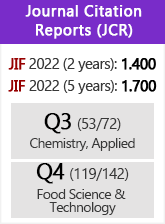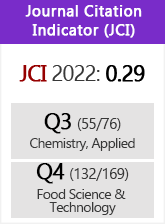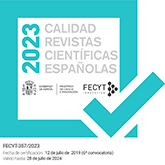Implications for the future and recommendations for modifications to current regulations concerning virgin olive oil
DOI:
https://doi.org/10.3989/gya.1994.v45.i1-2.971Keywords:
FLAIR Project, Virgin olive oilAbstract
The main conclusions of the FLAIR project can be summarized as follows:
1. The sensory wheel set up by the FLAIR team is proposed as a European standard to evaluate the sensory profile of extra virgin olive oil.
2. Preference studies demonstrate that the sensory profile of extra virgin olive oil should be optimized as a function of consumer expectations. Once a sensory profile has been selected, it must be used as a reference for product standardization.
3. Sensory analysis cannot be used as a legal tool for evaluating the quality or the origin of extra virgin olive oils. It is suggested that a sensory test can only be used as a legal tool if it is applied to assess the absence of defects. This implies a modification of the COI test.
4. The Good Manufacturing Practices set up by the Flair team are proposed as a European standard for process control and quality system certification.
5. Nutritional studies demonstrate that extra virgin olive oil has a noticeable in vivo antioxidant activity. This activity is related to the tocopherols and phenols content of oil and is highly varietydependent.
Downloads
Download data is not yet available.
Downloads
Published
1994-04-30
How to Cite
1.
Peri C, Rastelli C. Implications for the future and recommendations for modifications to current regulations concerning virgin olive oil. Grasas aceites [Internet]. 1994Apr.30 [cited 2024Apr.19];45(1-2):60-1. Available from: https://grasasyaceites.revistas.csic.es/index.php/grasasyaceites/article/view/971
Issue
Section
Monography
License
Copyright (c) 1994 Consejo Superior de Investigaciones Científicas (CSIC)

This work is licensed under a Creative Commons Attribution 4.0 International License.
© CSIC. Manuscripts published in both the printed and online versions of this Journal are the property of Consejo Superior de Investigaciones Científicas, and quoting this source is a requirement for any partial or full reproduction.All contents of this electronic edition, except where otherwise noted, are distributed under a “Creative Commons Attribution 4.0 International” (CC BY 4.0) License. You may read here the basic information and the legal text of the license. The indication of the CC BY 4.0 License must be expressly stated in this way when necessary.
Self-archiving in repositories, personal webpages or similar, of any version other than the published by the Editor, is not allowed.
















